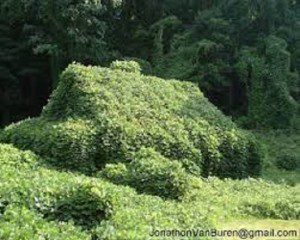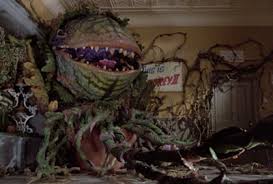In today’s gospel reading from Luke, Jesus’ disciples make a very simple request: “Increase our faith.” Jesus responds in his frequently over-the-top and inscrutable way: “If you had faith the size of a mustard seed, you could say to this mulberry tree, ‘Be uprooted and planted in the sea,’ and it would obey you.” Oh really? Figuring out exactly what Jesus is talking about requires learning something about the mustard plant. Bear with me.
My family and I spent three years in the middle nineties living in the South—specifically, Memphis. It was my first teaching job after graduate school. As dyed-in-the-wool Northerners, it was not an easy fit, but we were introduced to many new things—including kudzu .
.
Introduced from Asia in the late 19th century as a garden novelty, but not widely planted until the 1930s, kudzu is now America’s most infamous weed, earning the title of “the vine that ate the South.” According to Wikipedia, it is a
climbing, coiling, and trailing perennial vine native to much of eastern Asia, Southeast Asia, and some Pacific islands. The plant climbs over trees or shrubs and grows so rapidly that it kills them by heavy shading . . . Kudzu’s environmental and ecological damage results from acting through “interference competition,” meaning it outcompetes other species for a resource . . . Kudzu kills or damages other plants by smothering them under a blanket of leaves, encompassing tree trunks, breaking branches, or even uprooting entire trees. Kudzu’s ability to grow quickly, survive in areas of low nitrogen availability, and acquire resources quickly allows it to out-compete native species.
 Remember the carnivorous plant from “Little Shop of Horrors”? Kudzu is sort of like that.
Remember the carnivorous plant from “Little Shop of Horrors”? Kudzu is sort of like that.
Kudzu is everywhere in Tennessee (and elsewhere in the South); my first up-close encounter with it was when I was on a Cub Scout camping trip with my youngest son Justin at Fort Pillow State Park, out in the sticks about forty miles north of Memphis. Kudzu vines were threatening to envelop everything in sight—trees, telephone poles, bathroom facilities, a baseball field, and more. I expected it to envelop our tent in the middle of the night. I had heard a few stories about kudzu and asked one of the fellow adults whether it is true that kudzu grows so fast that you can hear it growing if things are quiet enough? “Are you shitting me?” my fellow father asked. “Cut off a couple inches of kudzu, throw it on the ground, spit on it, and stand back!”
I thought of kudzu one Sunday a couple of years ago, when the gospel reading was from Matthew 13, where Jesus likens the Kingdom of Heaven to all sorts of things. “The Kingdom of Heaven is like . . .” a mustard seed, yeast, a pearl, a net thrown into the sea, and so on. Our rector and my good friend Mitch had gone so far as to tape one tiny mustard seed on the front of each bulletin just so everyone could see how tiny and apparently insignificant a mustard seed is.
The fancy name for this series of “likes” is “The Similitudes,” a text so familiar that it takes some work to convince those of us who have spent multiple thousands of Sundays in church that there is anything new under the sun when it comes to such texts. I occasionally throw Jesus’ mustard seed and yeast analogies into my writing and teaching as illustrations of how, over time, unremarkable things (and persons) can have remarkable and unexpected effects on their surroundings. Yawn.
But as a good homilist should, Mitch found a slightly different angle on the text that opened up new ideas immediately. He began by quoting the following definition of “parable” from C. H. Dodd’s The Parables of the Kingdom:
At its simplest, a parable is a metaphor or simile, drawn from nature or the common life, arresting the hearer by its vividness or strangeness, and leaving the mind in sufficient doubt about its precise application to tease it into active thought.
What modern readers and hearers of the Similitudes easily miss, but Jesus’ contemporaries would have been jerked up short by, is that the mustard plant is a weed. It’s not as if Jesus is saying that “the Kingdom of Heaven is like a tiny seed that, over time, grows into something useful.” He’s saying that “the Kingdom of Heaven is like a weed that no farmer wants in his or her field.”
The mustard plant is native to the Middle East and Asia; it was introduced to North America sometime in the 20th century (probably freeloading along with some plant from across the ocean that people here actually wanted). Various websites note that wild mustard overwhelms wildflowers, useful grains, and other desirable plants by monopolizing moisture and producing seeds more quickly than its competitors, as well as by growing more quickly than surrounding plants, robbing them of needed sunshine and nutrients. In other words, when Jesus compares the Kingdom of Heaven to a mustard seed, he’s saying that the Kingdom of Heaven is like kudzu. What’s up with that?
Remember that, according to C. H. Dodd, a parable is intentionally vivid and strange, forcing the hearer into active thought in order to figure out the parable’s possibly multiple meanings. Supposing that, as Jesus often said, the Kingdom of Heaven is here (and an analogy for living out the life of following Jesus), a bit of active thought about likening the Kingdom to fast-growing weeds suggests several possibilities:
- The Kingdom of Heaven is unpredictable. To use another familiar simile, following Jesus is like Forrest Gump’s box of chocolates. You never know what you’re going to get. The life of faith is almost never what one expects it to be—just as Jesus warned. It is so unpredictable and unrewarding measured by normal expectations that Teresa of Avila told God in a prayer that “no wonder you have so few friends, when you treat the ones you have so poorly.”
- The Kingdom of Heaven cannot be harnessed or domesticated. Kudzu apparently was originally imported into this country as an ornamental vine to shade homes. Surprise! It soon started eating those homes. Over the six decades of my life I have often been amused by how disrespectful the divine appears to be of our various attempts to domesticate and harness our interactions with what is greater than us. Liturgy? Doctrine? Dogma? As soon as you think you’ve got it figured out, be looking for ways in which real engagement with faith and the divine does an end run on our systems and expectations.
- The Kingdom of Heaven is risky, even dangerous. I discover every semester that the large majority of my students, many of whom are products of twelve years of parochial education, believe that “comfort” is the primary reason to be a person of faith. In response, I often draw their attention to what Jesus actually said to his follower wannabes in the Gospels. Be prepared to give everything up, including your life, if you are a follower of Jesus. Everything is on the table and up for grabs—no one gets out of here the same. Those who thought kudzu would be a pretty addition to the garden soon couldn’t even find their garden. Those who think that the life of faith will be an attractive, sometimes entertaining hobby find themselves denying everything and taking up their cross.
“The Kingdom of Heaven is like a weed” is intended to be provocative and iconoclastic. If nothing else, the comparison should remind us that whenever we think we’ve got things under control, we should probably spit on it and stand back.













